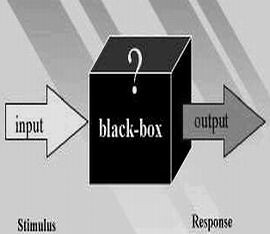Black box theory
Black Box ( " black box " ) is in behavioral biology, especially in the early behaviorism a metaphor for all the mental and cognitive processes that are not (yet) compete with scientific methods objectively, describe, and can be reproduced. The metaphor is based on the epistemology of objectivism. The term appeal refers not here, as in physiology, a discrete physical event, but all the (relevant) internal and external stimuli of a given situation.
As a black box is called - based for example on JB Watson - thus the model of a system for processing of internal and external stimuli, whose structure is unknown ( yet): one box, whilst not having input and output whose inner life but is dark or is declared to be uninteresting.
In the early behaviorism, the learner was considered as a black box, whose motivation, thinking, creativity and memory as a scientific study were not accessible ( methodological behaviorism ). Is important is that the last as desired specified behavior ( eg knowledge ) is shown.
With the metaphor Black Box is working today in the field of physiology, when a first approach to an as yet unknown interaction of elements, for example, a certain range of the nervous system is to be achieved: water is then for example a signal on the " input" and reads the " output" from. With a sufficiently large number and variance of input and output patterns can be as a first hypothesis about form what is happening " inside " the black box inside.
The philosophical theory of radical constructivism posits that people interact with each other, as if the respective opposite a black box, since you do not know the inner workings and draw conclusions only from those made by outside signals to the inner life could. The query signal here is called communication.
- Behaviorism










